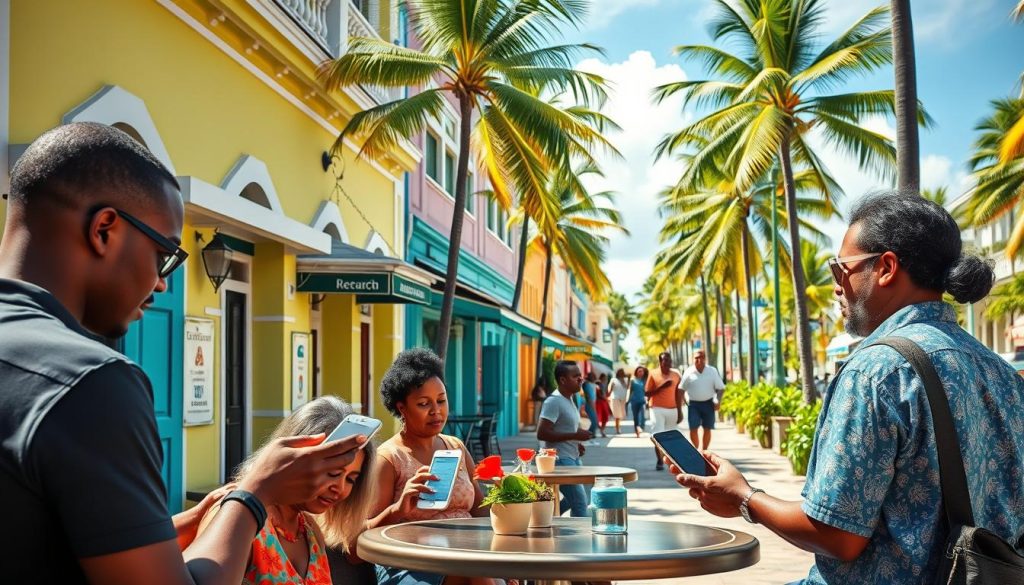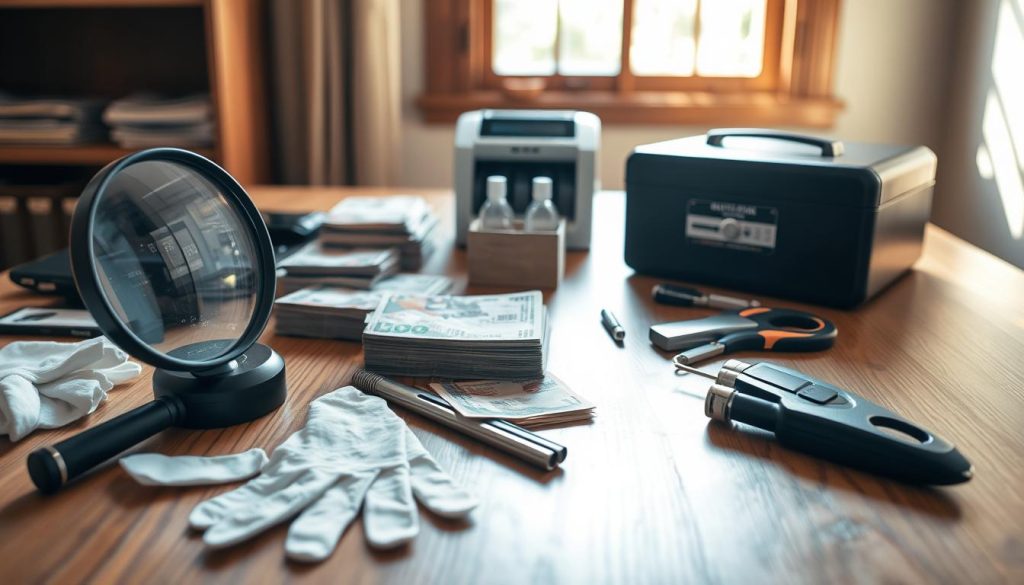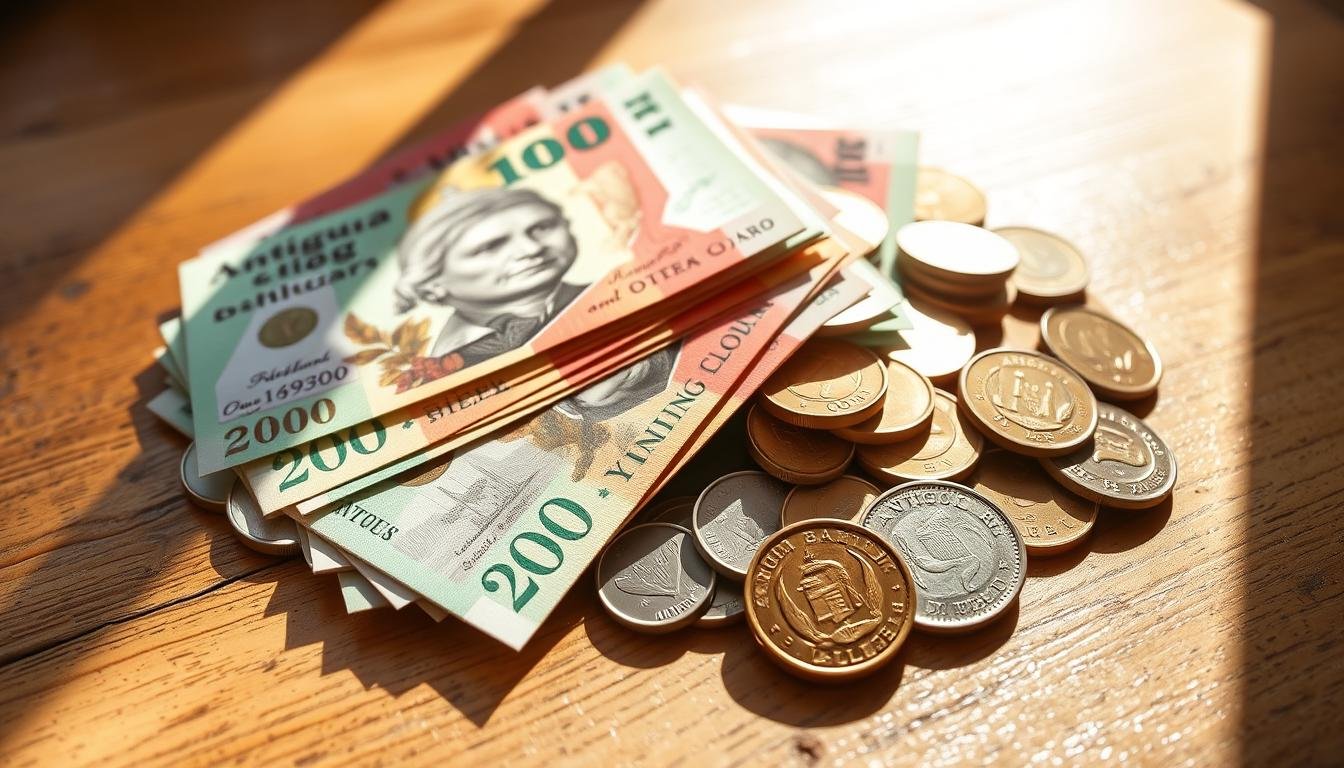✓ Accommodations✓ Flights✓ Rental Cars✓ Tours & Activities
Did you know the Eastern Caribbean dollar has been fixed to the US dollar at a stable rate for over 50 years? This makes it one of the most reliable currencies in the Caribbean. If you’re planning a trip to the stunning islands of Antigua and Barbuda, understanding the local payment systems is key to a hassle-free experience.
These islands are known for their breathtaking beaches and vibrant culture. But navigating the local currency and payment methods can be tricky if you’re unprepared. From ATMs to credit card usage, knowing the ins and outs will save you time and stress.
This guide covers everything you need to know. Whether you’re exchanging money or planning your budget, we’ve got you covered. Dive in to explore the best tips for managing your finances while enjoying this Caribbean paradise.
Welcome to Antigua and Barbuda: Your Gateway to a Hassle-Free Trip
Imagine stepping onto pristine shores where every day feels like a new adventure. These islands are a haven of natural beauty, cultural richness, and endless opportunities for exploration. Whether you’re lounging on one of the 365 beaches or diving into the vibrant local scene, your trip promises to be unforgettable.
What You Can Expect on Your Island Adventure
From crystal-clear waters to lush hiking trails, there’s something for everyone. Shirley Heights offers stunning sunset views, while Galleon Beach is perfect for snorkeling and spotting sea turtles. Don’t miss the chance to explore the local cuisine, featuring unique dishes like Conch Water and Black Pineapple.
Setting the Stage for a Smooth Payment Experience
Navigating payments here is straightforward. Most establishments accept credit cards, making it a widely accepted option. ATMs are conveniently located in towns and tourist areas, dispensing the local currency. For small vendors and markets, cash is preferred, but you’ll rarely encounter extra fees.
“The ease of transactions ensures you can focus on enjoying your trip without unnecessary stress.”
Currency exchange services are available at the airport and resorts, though it’s wise to compare rates. Tipping is appreciated but not mandatory—10% at restaurants and rounding up taxi fares is customary. With both cash and cards as viable options, you’ll have the flexibility to manage your finances effortlessly.
Antigua and Barbuda: Ultimate Travelers Guide to Currencies & Payments
Planning your day-to-day finances is easier when you know the local payment options. This guide helps you navigate the islands’ payment systems, ensuring a smooth experience during your trip.
Understanding the exchange rate is key. The Eastern Caribbean dollar is fixed at EC$2.70 to US$1, making budgeting straightforward. This stability ensures your travel expenses remain predictable, allowing you to focus on enjoying your time in this beautiful country.

Whether you’re here for a short visit or an extended stay, knowing the local payment methods simplifies interactions. Most establishments accept credit cards, while cash is preferred at smaller vendors and markets. ATMs are widely available, dispensing the local currency for your convenience.
Here’s a quick overview of common payment methods:
| Payment Method | Where to Use | Tips |
|---|---|---|
| Credit Cards | Hotels, restaurants, larger stores | Notify your bank to avoid transaction issues |
| ATMs | Towns, tourist areas | Check for fees and withdraw in local currency |
| Cash | Markets, small vendors, taxis | Carry small bills for convenience |
Knowing the exchange rate and payment options ensures a stress-free trip. From dining out to shopping, you’ll feel confident managing your finances. This guide is your go-to resource for a seamless experience in this friendly country.
Understanding the Eastern Caribbean Dollar: The Official Currency
The Eastern Caribbean dollar is the backbone of financial transactions in this region. As the official currency, it’s widely accepted and trusted by locals and visitors alike. Whether you’re shopping at a market or dining at a beachside café, this currency ensures smooth transactions.
Exchange Rates and Stability Explained
The Eastern Caribbean dollar has been pegged to the US dollar at a fixed rate of 2.70 XCD to 1 USD since 1976. This stability makes it easy to budget for your trip. You won’t have to worry about fluctuating rates affecting your expenses.
This fixed rate also benefits local businesses. It provides predictability in pricing, ensuring a fair experience for everyone. Whether you’re planning a short visit or an extended stay, this system simplifies financial planning.
Local vs. US Dollars: Which to Use and When
While the Eastern Caribbean dollar is the official currency, US dollars are often accepted in tourist areas. However, using the local currency is usually more cost-effective. You’ll avoid potential exchange rate markups at smaller vendors.
For everyday purchases like snacks or souvenirs, it’s best to carry local currency. Larger establishments, such as hotels and restaurants, may accept US dollars but often provide change in Eastern Caribbean dollars. This is a helpful tip to keep in mind during your travel.
| Currency | Best Use | Tips |
|---|---|---|
| Eastern Caribbean Dollar | Markets, small vendors, local transport | Carry small bills for convenience |
| US Dollar | Hotels, resorts, larger stores | Check for exchange rates and fees |
Managing your cash wisely ensures a stress-free experience. Whether you’re relaxing on the beach or exploring local attractions, understanding the Eastern Caribbean dollar will make your trip more enjoyable.
Practical Currency Exchange Options for Tourists
When traveling, knowing where and how to exchange currency can make your trip smoother. Whether you’re arriving at the airport or exploring the islands, having the right cash on hand is essential. Here’s a breakdown of the best options to ensure you’re prepared.
Using ATMs and Banks Across the Islands
ATMs are widely available in towns and tourist areas, making them a convenient choice. Most operate during standard banking hours, typically from 8 am to 4:30 pm on weekdays and until noon on Saturdays. Always check for fees and withdraw in the local currency for the best rates.
Banks are another reliable place for currency exchange. They offer competitive rates and secure transactions. Some even provide services tailored to travelers, ensuring you meet all requirements without hassle.
Authorized Currency Exchange Offices and Their Rates
Authorized exchange offices are a great alternative for quick transactions. These venues often offer rates that are close to the mid-market rate, saving you money. Look for offices in major tourist hubs or near your home base for convenience.
It’s wise to compare rates before exchanging large sums. Airport counters may be less competitive, so consider local banks or online platforms for better deals.

| Option | Best For | Tips |
|---|---|---|
| ATMs | Convenience, local currency | Check for fees and operating hours |
| Banks | Secure transactions, competitive rates | Bring ID and meet all requirements |
| Exchange Offices | Quick transactions, mid-market rates | Compare rates before exchanging |
Carrying a small amount of US dollars as a backup is also a smart move. While the local currency is widely accepted, US dollars can come in handy in certain places. With these tips, you’ll feel confident managing your money during your trip.
Using Credit and Debit Cards: Tips for Seamless Transactions
Using credit and debit cards in this destination ensures convenience and flexibility for every visitor. Major cards like Visa and Mastercard are widely accepted, making them a preferred choice for many travelers. However, a few simple steps can help you avoid unnecessary fees and ensure smooth transactions.
Notifying Your Bank and Avoiding Transaction Fees
Before your trip, notify your bank about your travel plans. This prevents your card from being flagged for suspicious activity. Many banks offer online tools or apps to update your travel details easily.
Foreign transaction fees can add up quickly. Some cards charge 1% to 3% per transaction. To save money, consider using a card with no foreign transaction fees. This will help you stay within budget while enjoying your destination.
“Informing your bank before traveling is a small step that can save you from big headaches.”
Handling Card Payments in Tourist Hotspots
In popular tourist areas, credit cards are widely accepted. From restaurants to souvenir shops, you’ll find it easy to use your card. However, smaller vendors or local markets may prefer cash, so it’s good to carry some Eastern Caribbean dollars as a backup.
Dynamic exchange rates can affect your payments. When using a card, the rate is applied at the time of the transaction. Compare this with cash exchange rates to make informed decisions. This ensures you get the best value for your money.
| Payment Scenario | Best Option | Tips |
|---|---|---|
| Dining at Restaurants | Credit Card | Check for foreign transaction fees |
| Shopping at Markets | Cash (Eastern Caribbean Dollar) | Carry small bills for convenience |
| Booking Tours | Credit Card | Notify your bank in advance |
While credit cards are convenient, having local currency is beneficial for emergencies. It’s also useful for tipping or small purchases. With these tips, you’ll navigate your financial transactions effortlessly, allowing you to focus on enjoying your destination.
Managing Cash and Mobile Payment Solutions
Balancing cash and mobile payments can enhance your travel experience in this tropical paradise. While cash remains essential for smaller vendors and beachside shops, mobile payment solutions are gaining popularity among tech-savvy travelers. Understanding how to manage both ensures a seamless and secure trip.
Carrying Cash Safely While Enjoying the Beach
When exploring beaches, carrying cash is often necessary for small purchases like snacks or souvenirs. To keep your money safe, use a waterproof pouch or a hidden travel wallet. Avoid carrying large amounts and only bring what you need for the day.
For added security, split your cash between different pockets or bags. This reduces the risk of losing everything if one item is misplaced. Always keep an eye on your belongings, especially in crowded areas.
Modern Mobile Payment Solutions
Mobile payments are becoming a convenient alternative to traditional cash transactions. Apps like PayPal and Venmo allow you to pay quickly and securely. Many local businesses now accept these methods, especially in tourist hotspots.
Using a recognized card like Visa can also simplify payments. These cards are widely accepted and often come with benefits like fraud protection. Notify your bank before traveling to avoid transaction issues.
“Mobile payments offer speed and convenience, but always prioritize security in less familiar environments.”
Choosing the Right Mix of Cash and Cards
Deciding between cash and cards depends on your activities. For dining at restaurants or booking tours, a credit card is often the best choice. For markets and small vendors, cash is preferred.
Here’s a quick comparison to help you decide:
| Payment Method | Best Use | Tips |
|---|---|---|
| Cash | Markets, small vendors, beachside shops | Carry small bills for convenience |
| Credit Card | Restaurants, hotels, larger stores | Check for foreign transaction fees |
| Mobile Payments | Tourist hotspots, tech-savvy businesses | Use secure apps and enable two-factor authentication |
By combining cash, cards, and mobile payments, you’ll have the flexibility to enjoy your trip without financial stress. Always prioritize safety and stay informed about the best options for each situation.
Navigating Currency Conversion Fees and Local Charges
Understanding currency conversion fees can save you money and make your trip more enjoyable. These fees can add up quickly, especially if you’re not prepared. Knowing how to minimize them ensures you stay within budget while exploring this beautiful destination.
Strategies to Minimize Extra Fees
One of the best ways to reduce fees is by timing your withdrawals. ATMs often charge a flat fee or a percentage of the transaction. Consolidating your transactions into fewer, larger withdrawals can help you save.
Using a credit card with no foreign transaction fees is another smart move. These cards eliminate extra costs when making purchases abroad. Always notify your bank before traveling to avoid any issues with your card.
Local banks and currency exchange bureaus often offer better rates than airports or hotels. Comparing rates before exchanging large sums can save you a significant amount of money.
Understanding Service Charges and Seasonal Variations
Service charges can vary depending on the time of year. During peak tourist seasons, some businesses may increase fees. Planning your budget to account for these variations ensures you’re not caught off guard.
For example, hotels might add a service charge during busy months. Checking these details in advance helps you avoid unexpected costs. Always ask about additional fees when booking accommodations or tours.
Here’s a quick guide to managing fees:
| Fee Type | How to Minimize | Tips |
|---|---|---|
| ATM Fees | Withdraw larger amounts less frequently | Check for free withdrawal limits |
| Currency Conversion | Use cards with no foreign transaction fees | Compare rates at local banks |
| Service Charges | Plan for seasonal variations | Ask about fees when booking |
By following these strategies, you can keep more money in your pocket. This allows you to focus on enjoying your trip without worrying about extra costs. With a little planning, you’ll navigate currency conversion fees and local charges like a pro.
Safety Measures for Handling Money on the Islands
Staying safe with your money is a top priority when exploring new destinations. Whether you’re in a bustling tourist area or a quiet beachside spot, protecting your finances ensures a stress-free experience. Here’s how to keep your cash, cards, and documents secure while enjoying your trip.
Tips for Securing Your Cash and Important Documents
Divide your cash and store it in multiple locations. This reduces the risk of losing everything if one spot is compromised. Use a hotel safe for valuables and only carry what you need for the day.
Keep important documents like your passport and credit cards in a secure, waterproof pouch. Avoid displaying large amounts of cash in public areas. This simple step can deter potential theft.
“A little preparation goes a long way in keeping your finances safe.”
Best Practices for Using Public ATMs and Digital Payments
When using ATMs, choose well-lit, secure areas. Avoid standalone machines in isolated locations. Always cover the keypad when entering your PIN to prevent skimming.
Digital payments offer added security and convenience. Apps like PayPal or Venmo are widely accepted in tourist hotspots. Notify your bank before traveling to avoid transaction issues with your card.

| Safety Measure | Best Use | Tips |
|---|---|---|
| Divided Cash | Reduces theft risk | Store in multiple locations |
| Hotel Safe | Secure valuables | Use for passports and extra cash |
| Digital Payments | Convenient and secure | Notify your bank in advance |
By following these safety measures, you can enjoy your trip without worrying about your finances. Whether you’re using the eastern caribbean dollar or digital services, staying vigilant ensures a smooth experience.
Payment Etiquette and Tipping Practices in Antigua and Barbuda
Understanding local payment etiquette can enhance your travel experience and foster goodwill with locals. Knowing when to tip and how to pay ensures smooth interactions and shows respect for the culture. Here’s a guide to help you navigate these social nuances.
Appropriate Tips at Restaurants, Taxis, and Hotels
Tipping is a way to show appreciation for good service. In restaurants, a 10-15% tip is customary if a service charge isn’t included. For taxi drivers, rounding up the fare or adding $1-$2 is standard. At hotels, tipping bellhops $1-$2 per bag and housekeeping $2 per day is appreciated.
In all-inclusive resorts, tipping is often discouraged as it’s included in the rate. However, if you receive exceptional service, a small tip can go a long way. Always check your bill to avoid double-tipping.
When to Use Cash Versus Card at Local Establishments
While credit cards are widely accepted, cash is preferred at smaller local establishments. Markets, street vendors, and beachside shops often operate on a cash-only basis. Carrying the official currency ensures you’re prepared for these situations.
For larger purchases or at hotels, using a card is convenient. Notify your bank before traveling to avoid transaction issues. Some businesses may add a small fee for card payments, so it’s wise to ask beforehand.
“Using the right payment method shows respect for local customs and ensures a hassle-free experience.”
Here’s a quick comparison to help you decide:
| Establishment | Preferred Payment | Tips |
|---|---|---|
| Restaurants | Card or Cash | Check for included service charges |
| Taxis | Cash | Round up or add $1-$2 |
| Hotels | Card | Tip bellhops and housekeeping in cash |
Following these practices ensures you navigate payments smoothly. Whether you’re dining out or exploring local markets, being prepared fosters positive interactions with company staff and locals alike.
Insider Advice for Budgeting and Managing Your Travel Finances
Planning your finances wisely ensures you make the most of your trip without overspending. A well-thought-out budget helps you enjoy every moment without worrying about costs. Whether you’re dining out, exploring attractions, or taking a taxi, knowing how to manage your money is key.
Budgeting for Daily Expenses and Tourist Activities
Start by estimating your daily costs. Meals at local restaurants can range from $9 for inexpensive options to $50 for a three-course meal. For transportation, a one-way bus ride costs $1, while a taxi ride from the airport to the city center is around $15.50. These small expenses add up, so plan accordingly.
Seasonal variations can impact your budget. During peak tourist season, prices for accommodations and activities may rise. Booking in advance or traveling during off-peak times can save you up to 50%. Keep this in mind when planning your trip.

Tracking your spending is essential. Use apps or a simple notebook to record expenses. This helps you stay within your budget and identify areas where you can save. Look for deals on tours and activities, especially during the off-season.
Planning Tips for Budget-Conscious Travelers
Consider staying in budget-friendly accommodations like hostels or Airbnb. Hostels range from $20 to $30 per night, while private rooms cost $40 to $230. For meals, opt for local markets or casual take-out options, which are more affordable than sit-down restaurants.
Transportation costs can vary. Renting a car might be more economical than relying on taxis, especially if you plan to explore extensively. Compare prices and choose the option that fits your budget.
Here’s a quick breakdown of daily expenses for different budgets:
| Budget Type | Accommodation | Meals | Transportation |
|---|---|---|---|
| Backpacker | $20-$30 | $10-$15 | $5-$10 |
| Mid-Range | $40-$110 | $20-$30 | $15-$20 |
| Upscale | $110-$250 | $50+ | $20+ |
By following these tips, you can create a budget that works for you. Whether you’re traveling during the peak season or off-peak months, careful planning ensures a stress-free and enjoyable experience.
Conclusion
Exploring the financial landscape of this destination ensures a smooth and enjoyable journey. From the ease of using credit cards to the convenience of local ATMs, managing your money here is straightforward. Whether you’re dining at a restaurant or shopping at a market, understanding the local payment methods enhances your travel life.
This guide provides trusted information to help you navigate every thing from currency exchange to tipping practices. The history of the Eastern Caribbean dollar adds a unique cultural layer to your experience. By blending modern digital payments with traditional cash methods, you’ll feel confident and secure during your stay.
We invite you to embrace all this destination has to offer. Let every transaction be a part of your memorable journey. Refer back to this guide for insights that make your trip seamless and enjoyable.
The above is subject to change.
Check back often to TRAVEL.COM for the latest travel tips and deals.





